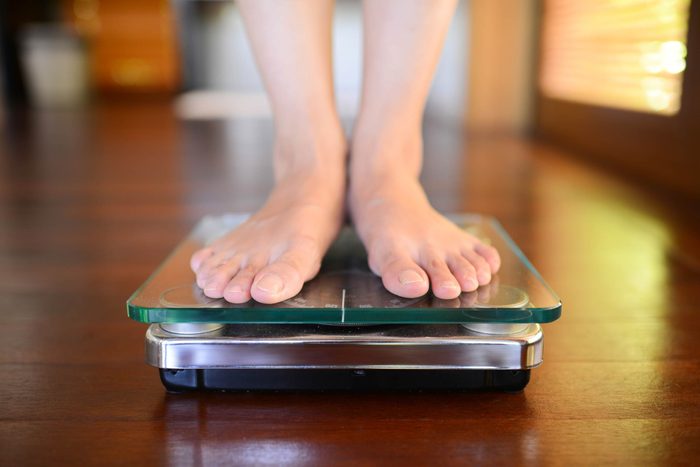What happens when you go to sleep hungry?
If you don’t keep an eye on the clock, you might occasionally find yourself going to bed hungry or eating late at night instead. Neither are necessarily great options. Skipping meals won’t cure your cravings, and the later you eat, the more likely you’ll make poor food choices. But don’t stress, it’s not necessarily all bad news, according to nutrition experts. If you’re hungry at night, but opt for sleep instead of food, here’s how your body might respond.

You could get less shut-eye
Hitting the hay without eating dinner could leave you tossing and turning into the wee hours of the morning. You might feel fine after skipping dinner, but when you finally fall asleep, hunger pangs keep the brain mentally alert, causing you to not get enough deep sleep at night, according to registered dietitian Wesley Delbridge, spokesperson for the Academy for Nutrition and Dietetics. Going to bed hungry can actually backfire because you won’t get a full night’s rest, he explains. Try one of these nutritionist-approved healthy late-night snacks to avoid missing your z’s.

You could gain weight
“A lot of people feel like they’re accomplishing something by going to bed hungry,” Delbridge says. But in reality, “the more you feel like you’re starving, the more likely you are to binge later on.” If you wait until you’re extremely hungry to eat, your blood sugar levels could fall so low that you’ll be tempted to wolf down whatever’s in sight. Even worse, sleeping on an empty stomach could lead to a big food binge in the a.m., peaking your blood sugar to unhealthy levels and throwing your metabolism for a loop for the rest of the day. Nibble on a square of dark chocolate or a small handful of nuts, if you’re hungry at night, to hold you over until the next morning. (Make sure your hunger isn’t a sign of one of these underlying medical issues.)

You could lose muscle mass
Counting reps at the gym could mean nothing if you go to bed hungry. Undereating means you won’t have the nutrients necessary to convert protein into muscle, and your body will start breaking down muscle for energy, instead, according to a study done by the European Society of Cardiology. Do this long enough and you can even hurt your most important muscle—your heart, they added. To get the most out of your day’s workout and prevent muscle loss, try to eat dinner a few hours before hitting the hay, making sure to eat plenty of protein, the researchers said.

You could have less energy
Think your body doesn’t need food at night? Think again. “Your body is constantly using energy 24 hours a day, burning calories all the time,” says Delbridge, which means you need to keep it fueled by eating healthy to maintain peak efficiency levels even while you sleep. Florida State University researchers found that men who had a shake with 30 grams of protein before bed experienced a higher resting energy expenditure (how much energy, or calories, the body burns at rest) the next morning compared to those who ate nothing before bed. If you go to bed hungry at night, your depleted energy levels could have a lasting effect on the rest of your day, so grab a small bite to eat (maybe even food that helps you sleep) before snoozing.

You could be crankier
Operating on an empty stomach can make anyone a grouch, but if you’re strolling into work sans breakfast and you went to bed hungry the night before, you could turn into a downright Scrooge. There’s even scientific evidence to justify those dangerous mood swings. Researchers from the University of Cambridge found that levels of serotonin—the behavior-regulating hormone—start fluctuating when people haven’t eaten, which affects parts of the brain that help people control their anger. Even on a full stomach, there could be a medical reason as to why you’re so irritable.

You could regulate your munching
Going to bed hungry isn’t all bad—in fact, it can help you stick to a regular meal schedule. If you are hungry before bed, you could wake up ravenous and ready to chow down on a filling breakfast. So long as that breakfast is fiber and protein-rich, putting your body into a mealtime routine reaps huge advantages for weight loss and a healthy lifestyle, encouraging you to avoid excessive (and calorie-heavy!) snacking throughout the day. According to a 2005 study published in the American Journal of Clinical Nutrition, regular meals provided sustainable energy and maintained a healthy metabolism for obese women. (Why can’t you stop eating? There may be a scientific reason you’re always hungry.)

You could slim down
Another potential plus to skipping late-night noshing and going to bed hungry at night: Research shows that eating late at night is making you gain weight. Falling asleep with a bloated belly can cause spikes of insulin and glucose in your bloodstream, and since you’re less active at night, your body turns those extra calories into fat while you sleep. Instead, some experts suggest going`at least 12 hours between dinner and breakfast. In a study published in the journal Cell Metabolism, scientists found that mice that fasted for 16 hours (and still chowed down on high-fat, high-calorie fare) were almost as lean as those who ate a healthy diet. Still, it’s important to avoid gorging on stacks of pancakes and candy bars during the day. Instead, find a healthy balance of nutrients in each meal (and load up on protein and fiber!) to avoid a rumbling belly by bedtime.
